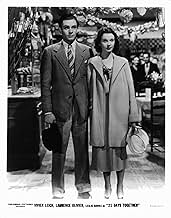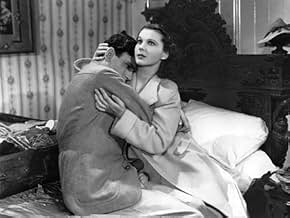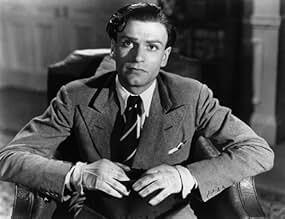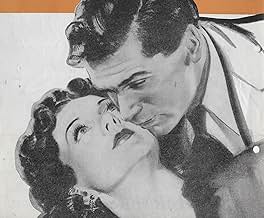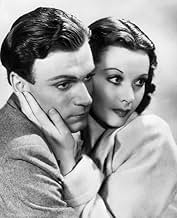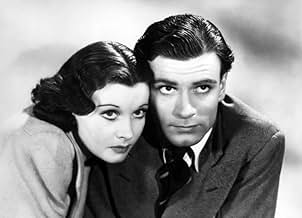IMDb RATING
6.1/10
1.4K
YOUR RATING
After Larry accidentally kills his lover Wanda's estranged blackmailing husband, someone else is arrested for the crime. Larry and Wanda nervously await the verdict: if the innocent suspect ... Read allAfter Larry accidentally kills his lover Wanda's estranged blackmailing husband, someone else is arrested for the crime. Larry and Wanda nervously await the verdict: if the innocent suspect is found guilty then Larry will give himself up.After Larry accidentally kills his lover Wanda's estranged blackmailing husband, someone else is arrested for the crime. Larry and Wanda nervously await the verdict: if the innocent suspect is found guilty then Larry will give himself up.
- Director
- Writers
- Stars
Elliott Mason
- Frau. Grunlich
- (as Elliot Mason)
Howard Douglas
- Man Asking for Cigarette
- (uncredited)
- Director
- Writers
- All cast & crew
- Production, box office & more at IMDbPro
Featured reviews
Apparently this is one of those Galsworthy dilemma stories. In it Olivier, early in his career inadvertently kills a man, the estranged husband of his new love. He is faced with the considerable struggle with conscience because a man has been blamed for the act and will face the music. What to do. What to do. We are put in the position of hoping all will somehow work out. I won't spoil the ending, but I will say that Olivier's character could have been sent to the gallows for terminal boredom. At no point did I really care one way or the other. He is selfish in many ways and rather cowardly. While the victim is made to have no redeeming qualities, his death really serves nothing other than that of a plot element. I suppose there is some of that stiff upper lip stuff going on, but at no time did I sit on the edge of my seat. Contrast this to the pain of Jean Valjean who faces a similar question. In that we all need to look inward. This just didn't ask much of me, and I was also greatly disappointed with the conclusion.
But not much plot. This was obviously a vehicle for its stars who were married at the time. Lawrence Olivier is quite wooden and stagey, Vivien glows, the camera just loves her. The story is a neat twist on ethics and morality with the wayward no-good brother standing firm for honesty and the uptight, successful barrister brother - on his way to becoming a judge - ready to hang an innocent man for a crime he did not commit. The twenty one days refer to the length of time the trial of this innocent man is going to take. The technical quality of the film was poor, the background of London was nearly washed out and the streets were obviously studio sets, not surprising, as it was filmed at the start of WW2. 5 out of 10, the ending was a bit of a let down and Larry really hams it up.
he film begins with two happy lovers (Laurence Olivier and Vivian Leigh) returning to her home. There, waiting for her is her husband--a man who she hasn't seen in three years. He demands money and then attacks Olivier--trying to stab him. In self-defense, Olivier kills the husband and dumps his body in an alley. He then visits his brother, a respected judge (Leslie Banks) and confesses. However, the brother surprisingly does NOT want him to go the police--which is odd, since it was a case of self-defense. It seems that he doesn't want this dirty laundry to be aired in public. For a time, things appear fine...until some other guy is arrested for the killing. Olivier cannot allow this to happen but his brother encourages him to be quiet--the defendant is sure to be found innocent. But, as the trial progresses, things look worse and worse for the defendant. And, all the while his brother, a respected judge, encourages the couple to leave the country and forget about the case. The problem is that Olivier's character has character--much more than his supposedly upright and respectable brother.
While the story is very simple and relatively easy to predict (though the ending was a bit of a twist), I liked the idea of two brothers who appear one way but are the opposite. Olivier's character is a bit of a rotter--gambling and living a rather frivolous life--but down deep, he has a conscience. His proper brother, however, is truly evil and can live with an innocent man being convicted and hung! Because it is a very good film, it is perplexing why Gainsborough Pictures shelved this movie for three years before finally releasing it. I'd love to know why.
While the story is very simple and relatively easy to predict (though the ending was a bit of a twist), I liked the idea of two brothers who appear one way but are the opposite. Olivier's character is a bit of a rotter--gambling and living a rather frivolous life--but down deep, he has a conscience. His proper brother, however, is truly evil and can live with an innocent man being convicted and hung! Because it is a very good film, it is perplexing why Gainsborough Pictures shelved this movie for three years before finally releasing it. I'd love to know why.
Although released in 1940 this picture was made in 1937, well before Leigh and Olivier were married. Producer Alexander Korda intended it as a career-boosting role for Leigh but, for whatever reasons, it was put-aside. Columbia bought the property in 1939 and released it after Leigh's success in "Gone with the wind".
The 1937 date explains what must seem to be an anomaly for modern audiences - the sympathetic treatment of the "Axis" characters, ie the German landlord and the Italian grocer.
Well-worth watching - the depth of talent in the supporting roles (Francis L Sullivan, Hay Petrie, Robert Newton etc) is notable.
The 1937 date explains what must seem to be an anomaly for modern audiences - the sympathetic treatment of the "Axis" characters, ie the German landlord and the Italian grocer.
Well-worth watching - the depth of talent in the supporting roles (Francis L Sullivan, Hay Petrie, Robert Newton etc) is notable.
There are many barriers to love, most can be overcome, but is murder one such obstacle, can a couple allow an innocent man to take the blame for their crime?
It's not as good as some of the movies I've seen from this era and in the same genre, but it is good, it's very watchable, and let's be honest, anything that features Vivian Leigh is worth watching.
It's perhaps a lack of suspense that is the stumbling block, you're left in no doubt as to the ending.
It's a good watch though, nicely made, and very well acted, 6/10.
It's not as good as some of the movies I've seen from this era and in the same genre, but it is good, it's very watchable, and let's be honest, anything that features Vivian Leigh is worth watching.
It's perhaps a lack of suspense that is the stumbling block, you're left in no doubt as to the ending.
It's a good watch though, nicely made, and very well acted, 6/10.
Did you know
- TriviaThe film was shot in 1937 but released on January 7, 1940. William Dewhurst (Lord Chief Justice) died on October 26, 1937. His only child, Paul, died in 1937 fighting in the Spanish Civil War, only a few months before Dewhurst's own demise.
- GoofsAt the end, when Wanda (Vivien Leigh) is chasing Larry (Laurence Olivier) through the streets, she isn't carrying anything. The camera goes to Larry, and when it goes back to her, she's carrying a newspaper as she's still running. Once again the camera goes back to Larry, and the next shot of her, she once again isn't carrying a newspaper but stops to buy one then continues to run after him.
- ConnectionsFeatured in The Making of a Legend: Gone with the Wind (1988)
- How long is 21 Days Together?Powered by Alexa
Details
- Release date
- Country of origin
- Languages
- Also known as
- The First and the Last
- Filming locations
- Southend-on-Sea, Essex, England, UK(Kursaal amusement park visited by Larry and Wanda)
- Production company
- See more company credits at IMDbPro
- Runtime
- 1h 12m(72 min)
- Color
- Aspect ratio
- 1.37 : 1
Contribute to this page
Suggest an edit or add missing content

